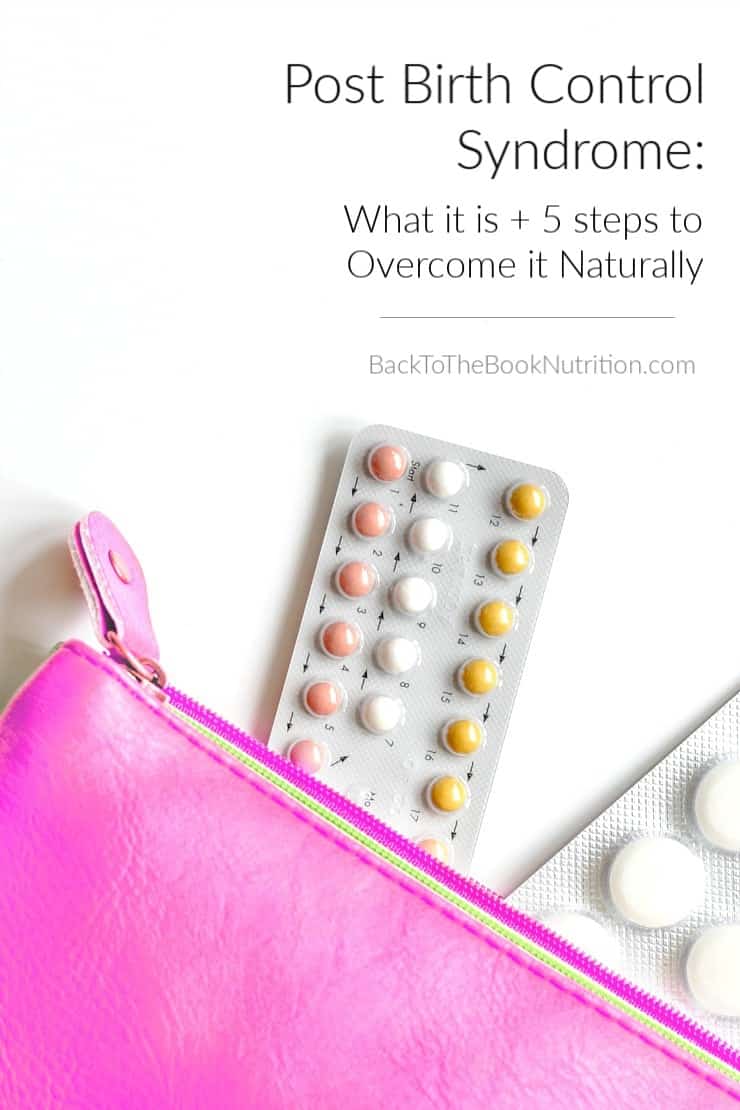Irregular periods, acne, mood swings, digestive issues, and other symptoms of Post Birth Control Syndrome (PBCS) can plague some women for months after they’ve stopped taking the pill or other forms of hormonal birth control. Learn 5 steps to overcome PBCS naturally.
Note from Dena: This post was co-written with Abbie Womack, Dietetic Intern, as part of a research partnership between Back To The Book Nutrition and post-graduate nutrition students from the University of Houston.
What is Post Birth Control Syndrome (PBCS)?
Although hormonal birth control has its downsides, it can be equally difficult to discontinue usage for some women (1). The hormone imbalances caused by the pill, IUDs, implants, transdermal patches, and any other form of hormonal birth control can take a while to correct.
Post Birth Control Syndrome (PBCS) is a term I first heard used by Dr. Jolene Brighten, and refers to a cluster of symptoms that can appear within 4-6 months after discontinuing birth control (4).
Symptoms of Post Birth Control Sydrome
- Loss of menstruation. This is called amenorrhea, and some studies suggest that 3-6% of women may never see their period return after using birth control (2).
- Irregular periods. This can include short cycles (fewer than 24 days), heavy bleeding, and painful periods (3).
- Hormonal changes. These can include infertility, hypothyroidism, HPA-axis dysfunction, and other changes you may not have experienced while on the pill (4).
- Changes in body composition. Many women experience weight gain, changes in breast size, and have difficulty losing weight.
- Mood disorders such as depression and heightened anxiety.
- Digestive symptoms. Some women have diarrhea, constipation, gas, and bloating.
- Immune imbalances. Inflammation can occur, causing a decrease in immunity and greater susceptibility to disease (6).
- Acne. Many women who had acne before the pill might experience more severe acne when discontinuing it, especially if they were on anti-androgen pills such as Yasmin, Yaz, Diane, and others. Acne may not appear for several months after stopping the pill, and may not peak until around 6 months after stopping.
- Hair Loss. This is especially common in women who took anti-androgen pills such as Yasmin, Yaz, Diane, and others.
- Rebound of symptoms for which you were put on the pill in the first place.
5 Steps to Overcome Post Birth Control Syndrome Naturally
The traditional medical community hardly recognizes PBCS, much less offers any solutions for it. Fortunately, these approaches can be very helpful to restore hormone balance and health.
It’s best to begin these efforts a few months before you stop using hormonal birth control in order to support your body through that transition. However, you can still benefit from adding them after you’ve discontinued birth control too.
1. Optimize your nutrition and correct deficiencies
Hormonal birth control depletes your body of a variety of key nutrients, including B vitamins, folate, zinc, selenium, and magnesium. Remember – it can take a few months for diet changes to result in changes to your menstrual cycle, so it’s important to be consistent for at least three months before evaluating whether it’s working for you.
- Eat a diet rich in plant foods as well as wild caught fish/seafood and carefully sourced animal products. Include dark leafy greens, poultry, red meat, nuts, and a variety of other fruits and vegetables to combat nutrient deficiencies.
- Supplement missing nutrients – supplement with a high quality multivitamin and magnesium glycinate (Find both here!), and consider testing for nutrient deficiencies through a holistic practitioner.
- Balance blood sugar by not skipping meals and making sure each meal includes a mix of carbohydrates, fat, and protein.
- Restore friendly gut bacteria by eating prebiotic and probiotic-rich foods such as yogurt, kombucha, fermented vegetables, and oats.
- Do a dairy free, low sugar trial for a few months if post-pill acne is a problem.
2. Establish hormonal balance
- Track your basal body temperature (BBT) daily to monitor monthly hormone levels and to ensure ovulation, as recovering ovulation is the top priority for restoring hormone balance.
- Support a healthy liver by avoiding environmental toxins and eating brassica and cruciferous vegetables as well as berries (5). Check out these 10 cheap and easy ways to support liver detox!
- Focus on fiber to have regular bowel movements, which helps eliminate excess hormone from the body (6). Aim for at least 30 grams of fiber per day.
3. Reset circadian rhythms.
Getting enough good quality sleep is critical for restoring hormone balance. Take our 5 Question Sleep Quality Quiz, then read this post for tips on how to sleep better naturally!
4. Reduce stress
Reduce and manage stress as much as possible. The body will literally steal precursors from the hormone-making process to fuel the stress response…this is a protective mechanism when it’s used for occasional periods of intense stress, but can be very damaging when it happens month after month and year after year because we maintain a lifestyle of chronic stress. Develop a stress management strategy that works for you such as meditation, prayer, journaling, or deep breathing (3).
Here are a few important reminders about stress:
- Remember that your body produces a stress response to both positive and negative stressors – so planning a wedding can be just as stressful as grieving the death of a loved one.
- Illness, autoimmunity, poor gut health, lack of sleep, blood sugar imbalance, and other physical stressors can take just as much of a toll on your body as emotional ones.
- Supplements to support for the HPA-axis (the glands that work together to manage our stress hormones) can be very helpful in some situations. Ask your provider if herbal adaptogens and/or glandular supplements are right for you.
5. Restore Gut Health
We know that hormonal birth control disrupts our gut microbiome. Sometimes, the above steps are enough to restore gut health. But, if you’re experiencing gut symptoms or if PBCS recovery is taking longer than expected, it may be helpful to work with a holistic practitioner to order a comprehensive stool test so that specific imbalances in the gut can be identified and addressed.
How long does recovery from PBCS take?
It can take up to a full year, and sometimes more, to restore healthy hormone balance. Be patient with your body and diligent with these strategies!
What to do if you can’t get your period back?
If it has been over 3 months since you discontinued birth control and your period still has not returned despite trying the strategies above, you might want to:
- Consider testing hormone levels to identify any specific imbalances. Follicle stimulating hormone (FSH), estradiol, progesterone, and thyroid hormone levels can all be tested (4).
- Consider testing for vitamin/mineral deficiencies, gut imbalances, or other underlying issues holding you back from full recovery
- Discuss herbs and other supplements to support menstruation with a holistic practitioner
As you can see, there are many strategies for supporting your body both on and off birth control. If you have more questions or would like more personalized support in your journey, our Holistic Nutrition Coaching program can help!
About the Co-Author
Abbie earned her Bachelors and Masters Degrees in Nutritional Sciences from Oklahoma State University, and is currently completing her dietetic internship with the University of Houston before going on to work in the field of eating disorders. Abbie is newly married and enjoys swimming and eating ice cream!
Disclaimer: Information on this site is intended only for informational purposes and is not a substitute for medical advice. Always consult with a trusted healthcare provider before implementing significant dietary change. Read additional disclaimer info here.
References:
References
- Gottfried, Sara. “Risks of Birth Control Pill: 8 Reasons To Quit and How to Stay Healthier If You Don’t.” Sara Gottfried MD, 2017,
- Buttram, J r, et al. “Post ‘Pill’ Amenorrhoea.” International Journal of Fertility., U.S. National Library of Medicine.
- Kresser, Chris. “Post-Birth Control Syndrome: 5 Tips for Treatment.” Kresser Institute, Kresserinstitute.com, 26 Jan. 2017.
- Brighten, Jolene. “Post-Birth Control Syndrome Is Real: Here’s How To Balance Your Hormones After The Pill.” Mindbodygreen, Mindbodygreen, 18 May 2017.
- Myers, Amy. “What You Need to Know Before Taking Birth Control Pills.” Amy Myers MD, 20 Feb. 2018.
- Aviva, Romm. The Post Birth Control Pill Hormone Reset. 3 Feb. 2018.




I’m on the pill now due to painful periods. I didn’t consider that you can have side effects when you stop taking birth control. I’ll definitely save these tips for future reference!
I am glad that you found it helpful, Eve. I’d definitely keep these things in mind since birth control really only suppresses the symptoms (in your case, pain), but the root cause may still be there and should likely be addressed at some point. This post also has some helpful insights as to what things can cause period pain.
Thanks for sharing the knowledge..! I’m glad I didn’t get to experience such syndrome, I will definitely share this helpful blog.
Glad you found it helpful, and that you did not experience the syndrome.
I’m 8 mos postpartum and still no monthly visit. I am not worried though, since I exclusively breastfeed my little one. Btw, thanks for the tips!
Thanks for sharing your experience, and you are welcome!
I had no idea this was a thing. It’s great you gave these wonderful tips. Hope it will help lot of people x
Laura
https://pinkfrenzymissl.blogspot.com/
Thank you so much for the wonderful and informative post.
This is a topic that needs to be discussed, out of taboo.
Very informative article. I stopped taking birth control long time ago and hope this is helpful to other women who needt the help.
Thanks for the comment Jay!
Very informative article about birth control. I admit this is too valuable not to be shared to my mommy friends. Thanks.
Thanks for the kind words. I hope that its able to help!
I stopped taking birth control a few years ago – hate the idea of taking hormones to change something that occurs naturally. Lost my period for about 7 months after, which was quite worrying. Now I’m super regular!
I am glad to hear that you had a successful resolution Maartje. Thank you for sharing your own story.
Wow.. Another addition to my knowledge..! I actually can’t relate to this syndrome due to the fact that I am not a mother yet.. 😂But this would be a great future reference.
I’ve taken birth control and will never againm it messed with my body so bad!!
I am so sorry to hear that Alyssa. If you are still having issues please give us a call, as I would like to see if we could help.